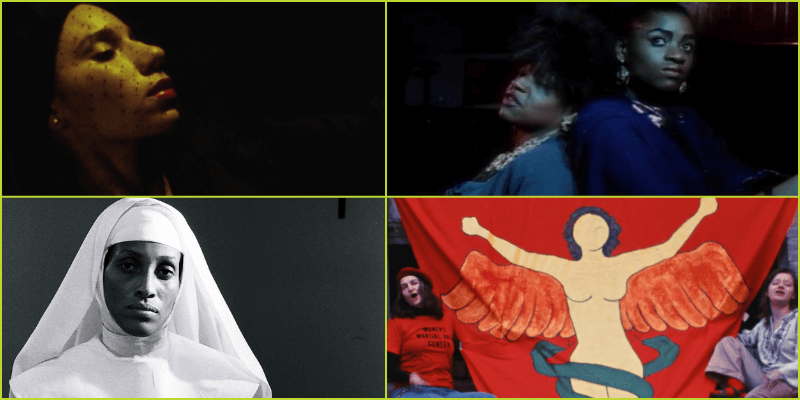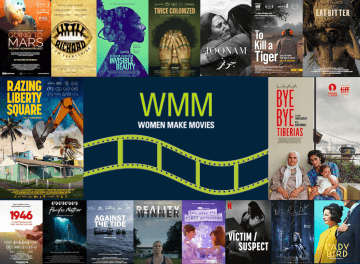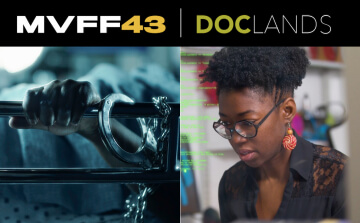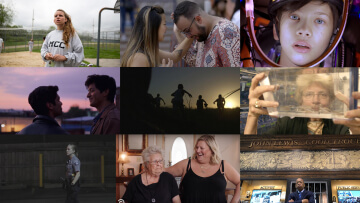“Preserving the stories and voices of those who have been historically marginalized is a political and feminist act, and these restored and preserved films make a crucial contribution to documenting the complexity and multiplicity of women’s history.”
– Amy Aquilino, Manager of Distribution & Digital Assets, WMM &
Steering Committee Member, Women’s Film Preservation Fund
We are delighted to share that five classic and pioneering films from the WMM collection have recently been restored, and 12 additional titles have been digitally preserved. All are now available to book for exhibitions, license to institutions and platforms, and more! Read more about the films below.
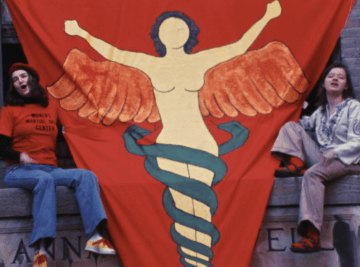 HEALTHCARING: FROM OUR END OF THE SPECULUM (dir. Denise Bostrom & Jane Warrenbrand and produced by Women Make Movies, 1976) is a pioneering, bold, and sensitive documentary — one of the first to honestly chronicle women’s relationship to gynecology and healthcare. Made more than four decades before #MeToo, the film was way ahead of its time, taking on issues of abuse by male doctors and portrays women taking control of their own vaginal exams. Women of all ages and backgrounds speak candidly of their experiences with the healthcare system, and the film documents the growing number of women who are questioning long standing medical practices and working to implement alternative and more effective health care. The positive, warm style of the film encourages women to share their own experiences and gain a better sense of their right to receive better healthcare.
HEALTHCARING: FROM OUR END OF THE SPECULUM (dir. Denise Bostrom & Jane Warrenbrand and produced by Women Make Movies, 1976) is a pioneering, bold, and sensitive documentary — one of the first to honestly chronicle women’s relationship to gynecology and healthcare. Made more than four decades before #MeToo, the film was way ahead of its time, taking on issues of abuse by male doctors and portrays women taking control of their own vaginal exams. Women of all ages and backgrounds speak candidly of their experiences with the healthcare system, and the film documents the growing number of women who are questioning long standing medical practices and working to implement alternative and more effective health care. The positive, warm style of the film encourages women to share their own experiences and gain a better sense of their right to receive better healthcare.
New 4K restoration funded by the HFPA Trust and IndieCollect donors to the Jane Fonda Fund for Women Directors.
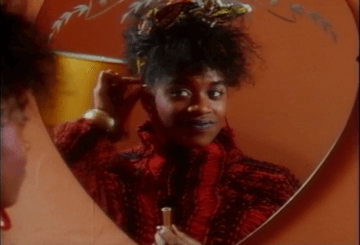 THE PASSION OF REMEMBRANCE (dir. Maureen Blackwood & Isaac Julien, 1986), the Sankofa collective’s greatly influential first film and a landmark work in British avant-garde film and video, ambitiously explores themes of racism, homophobia, sexism, and generational tensions as embodied in the reality known by a Black British family over the years. Interweaving two narrative threads—one in which a man and a woman discourse on their own experiences living in the UK, another in which events from three decades in the lives of the Baptiste family are staged—Maureen Blackwood and Isaac Julien tease the accumulated fragments into a spellbinding, heterogeneous mosaic that powerfully evokes the multiplicity of Black experience and identity and critiques the British state’s treatment of its marginalized residents.
THE PASSION OF REMEMBRANCE (dir. Maureen Blackwood & Isaac Julien, 1986), the Sankofa collective’s greatly influential first film and a landmark work in British avant-garde film and video, ambitiously explores themes of racism, homophobia, sexism, and generational tensions as embodied in the reality known by a Black British family over the years. Interweaving two narrative threads—one in which a man and a woman discourse on their own experiences living in the UK, another in which events from three decades in the lives of the Baptiste family are staged—Maureen Blackwood and Isaac Julien tease the accumulated fragments into a spellbinding, heterogeneous mosaic that powerfully evokes the multiplicity of Black experience and identity and critiques the British state’s treatment of its marginalized residents.
This 4K remaster by the BFI National Archive, undertaken in collaboration with the directors and cinematographer Nina Kellgren, is based on the original 16mm negative and magnetic soundtrack final mix.
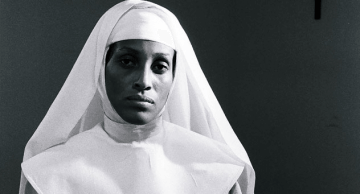 DIARY OF AN AFRICAN NUN (dir. Julie Dash, 1977), adapted from a short story by Alice Walker, follows a nun in Uganda consumed by doubt as she prepares to take vows of poverty, chastity, and obedience. Her anguish intensifies night after night as she lies in her convent room and listens to the rhythmic, beckoning drums of her village. This short, which precedes and anticipates her acclaimed feature DAUGHTERS OF THE DUST, was a deliberate first move by director Julie Dash toward narrative filmmaking.
DIARY OF AN AFRICAN NUN (dir. Julie Dash, 1977), adapted from a short story by Alice Walker, follows a nun in Uganda consumed by doubt as she prepares to take vows of poverty, chastity, and obedience. Her anguish intensifies night after night as she lies in her convent room and listens to the rhythmic, beckoning drums of her village. This short, which precedes and anticipates her acclaimed feature DAUGHTERS OF THE DUST, was a deliberate first move by director Julie Dash toward narrative filmmaking.
Restored by Indie Collect in collaboration with the UCLA Film Archive and Women Make Movies.
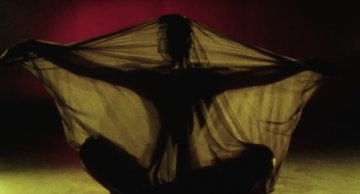 In FOUR WOMEN (dir. Julie Dash, 1975), one of the first experimental films by a Black woman filmmaker, dancer Linda Martina Young interprets the same-titled ballad by Nina Simone and embodies the spirits of four women — Aunt Sarah, Saffronia, Sweet Thing and Peaches — who represent common stereotypes of Black women attempting to survive in America. Just as Nina Simone sings as each of the four women, Linda Martina Young costumes herself as each woman and shifts her style of movement to embody each one. And Dash changes the editing style slightly, at times pausing the film, halting the fluidity of motion, before cross-dissolving it into the next shot.
In FOUR WOMEN (dir. Julie Dash, 1975), one of the first experimental films by a Black woman filmmaker, dancer Linda Martina Young interprets the same-titled ballad by Nina Simone and embodies the spirits of four women — Aunt Sarah, Saffronia, Sweet Thing and Peaches — who represent common stereotypes of Black women attempting to survive in America. Just as Nina Simone sings as each of the four women, Linda Martina Young costumes herself as each woman and shifts her style of movement to embody each one. And Dash changes the editing style slightly, at times pausing the film, halting the fluidity of motion, before cross-dissolving it into the next shot.
Restored by Indie Collect in collaboration with the UCLA Film Archive and Women Make Movies.
 GREETINGS FROM WASHINGTON, DC (dir. Rob Epstein, Frances Reid, Great Schiller, and Lucy Winer) documents the first National March on Washington for Lesbian and Gay Rights, which took place on October 14, 1979. LGBTQ+ history was made when tens of thousands of people converged on America’s capital, and this empowering documentary captures the joyous, intersectional spirit of an event that heralded the beginning of a new chapter in the national fight for queer rights and visibility. This film also made history with its world premiere in 1981 when it became the Frameline Film Festival’s first ever Castro Theatre screening.
GREETINGS FROM WASHINGTON, DC (dir. Rob Epstein, Frances Reid, Great Schiller, and Lucy Winer) documents the first National March on Washington for Lesbian and Gay Rights, which took place on October 14, 1979. LGBTQ+ history was made when tens of thousands of people converged on America’s capital, and this empowering documentary captures the joyous, intersectional spirit of an event that heralded the beginning of a new chapter in the national fight for queer rights and visibility. This film also made history with its world premiere in 1981 when it became the Frameline Film Festival’s first ever Castro Theatre screening.
Digitally restored by the UCLA Film & Television Archive in conjunction with the Outfest UCLA Legacy Project. Laboratory services provided by Metropolis Post, Audio Mechanics.
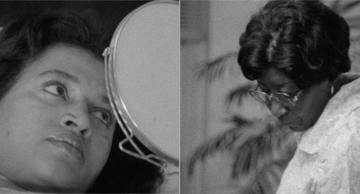 KILLING TIME and FANNIE’S FILM, two classic shorts directed by Fronza Woods, were part of the media-making movement that first gave centrality to the voices and experiences of African American women during the late Seventies and early Eighties, but they are no less groundbreaking today. KILLING TIME, an offbeat, wryly humorous look at the dilemma of a would-be suicide unable to find the right outfit to die in, examines the personal habits, socialization, and complexities of life that keep us going. In FANNIE’S FILM, a 65-year-old cleaning woman for a professional dancers’ exercise studio performs her job while telling us in voiceover about her life, hopes, goals, and feelings. A challenge to mainstream media’s ongoing stereotypes of women of color who earn their living as domestic workers, this seemingly simple documentary achieves a quiet revolution: the expressive portrait of a fully realized individual.
KILLING TIME and FANNIE’S FILM, two classic shorts directed by Fronza Woods, were part of the media-making movement that first gave centrality to the voices and experiences of African American women during the late Seventies and early Eighties, but they are no less groundbreaking today. KILLING TIME, an offbeat, wryly humorous look at the dilemma of a would-be suicide unable to find the right outfit to die in, examines the personal habits, socialization, and complexities of life that keep us going. In FANNIE’S FILM, a 65-year-old cleaning woman for a professional dancers’ exercise studio performs her job while telling us in voiceover about her life, hopes, goals, and feelings. A challenge to mainstream media’s ongoing stereotypes of women of color who earn their living as domestic workers, this seemingly simple documentary achieves a quiet revolution: the expressive portrait of a fully realized individual.
Preserved by the Academy Film Archive.
Women Make Movies, in partnership with the Women’s Film Preservation Fund (WFPF), has also been collaborating with the Moving Image Archiving and Preservation Program at NYU to preserve additional titles. With consultation and guidance from WMM’s Amy Aquilino, graduate students manage all aspects of the preservation: inspecting and cleaning video tape masters, cataloging materials, and creating digital files of titles in the WMM collection. Because of their ongoing efforts, we now have a total of thirteen preserved and digitized films, including three films from the WMM archive that are available for the first time digitally:
- SEVENTEEN ROOMS (dir. Caroline Sheldon) – Britain’s Channel 4 refused to broadcast this piece because of its subtitle: WHAT DO LESBIANS DO IN BED? The film looks into seventeen bedrooms to challenge the titillating promise of that question with home movie footage and texts such as “Sleep,” “Read,” and even “Sometimes Kiss.”
- MYRIAM’S GAZE (dir. Clara Riascos) – An inspirational portrait of Myriam, a woman living on the outskirts of Bogota, Columbia.
- COLOR SCHEMES (dir. Shu Lea Cheang) – An upbeat, ironic look at America’s multicultural society, COLOR SCHEMES uses the metaphor of “color wash” to tackle conceptions of racial assimilation.
We are incredibly grateful to the Moving Image Archiving and Preservation Program at NYU for their meticulous and ongoing work. To date, they have also digitized and preserved:
- HONORED BY THE MOON (dir. Mona Smith) – In this upbeat and empowering film, Native American lesbians and gay men speak of their unique historical and spiritual role.
- WHY WOMEN STAY (dir. Jacqueline Shortell-McSweeney and Debra Zimmerman) – This documentary examines the complex reasons why women remain in violent homes and challenges the prevailing attitudes which accept domestic violence as well as the social structures which perpetuate it.
- MY FILMMAKING, MY LIFE – Matilde Landeta (dir. Patricia Diaz) – Matilde Landeta entered the flourishing Mexican film industry in the 1930s, working her way up from script girl to direct 110 shorts and direct three features. In this engrossing documentary filmed in Mexico City, a vibrant Landeta, now in her 70s, recalls those years.
- MEASURES OF DISTANCE (dir. Mona Hatoum) – In this resonant work, Palestinian-born video and performance artist Mona Hatoum explores the renewal of friendship between mother and daughter during a brief family reunion in war-torn Lebanon in 1981.
- MEETING OF TWO QUEENS (dir. Cecilia Barriga) – In this witty, luminous film, Greta Garbo and Marlene Dietrich star in the roles of their lives—cast as lovers by Chilean video artist Barriga. Queen Christina meets the Scarlet Empress; Anna Karenina and Blonde Venus transcend tragedy.
- A KISS ON THE MOUTH (dir. Jacira Melo) – From the Lilith Video Collective comes this sensitive and sympathetic examination of female prostitution in urban Brazil.
- ON BECOMING A WOMAN (dir. Cheryl Chisholm) – This extraordinary documentary provides rare insights into some important health issues for African American women. Produced before AIDS was a major factor for women, it deals candidly and constructively with teen pregnancy, providing in-depth information about reproduction, birth control, self-examination and sexual activity; and
- FROM BEDSIDE TO BARGAINING TABLE (dir. Tami Gold and Lyn Goldfarb) – This inspiring documentary looks at nursing from the nurse’s point of view, encouraging healthcare professionals to work together to change their poor working conditions and gain self-respect.
Coming soon, two WMM films received 2023 grants from the Women’s Film Preservation Fund at NYWIFT and are currently being restored.
- TWO LIES (dir. Pam Tom) follows the generational conflict and the struggle for identity in a world of hybrid cultures of a Chinese American mother and her daughter; and
- IN THE BEST INTERESTS OF THE CHILDREN (dir. Frances Reid, Elizabeth Stevens & Cathy Zheutlin) portrays the diversity of experience, race and class among eight lesbian mothers and their children. We will update you when their restorations are complete and they are ready for exhibition.
“We’re incredibly happy to have these films from the WMM collection restored and preserved, so we can share our cultural heritage with future generations,” said Amy Aquilino, Manager of Distribution and Digital Assets at Women Make Movies and member of the Women’s Film Preservation Fund steering committee. “We believe preserving the stories and voices of those who have been historically marginalized is a political and feminist act, and these restored and preserved films make a crucial contribution to documenting the complexity and multiplicity of women’s history.”
All films are available for institutional purchase from WMM, licensing, or to book for exhibitions. Please contact [email protected] for details and price quotes.

